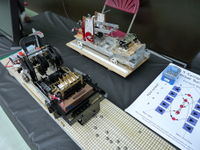Difference between revisions of "Mechanical computing"
From Makespace
(Created page with "User:JimM builds mechanical computers. They're incredibly slow, unreliable and almost entirely pointless. === Turing Machines === [[File:TuringMachines.jpeg|200px|thumb|left...") |
m |
||
| Line 2: | Line 2: | ||
=== Turing Machines === | === Turing Machines === | ||
| − | [[File:TuringMachines.jpeg|200px|thumb|left| | + | [[File:TuringMachines.jpeg|200px|thumb|left|Turing Machines]] Turing machines can be made with very low numbers of symbols and states and still be universal. It's been proved that a Turing machine with 3 symbols and 2 states can be capable of universal computation. This is simple enough to be implemented mechanically without having to make thousands of parts (as other mechanical computers have used). |
The price for the simplicity of the machine is terrible code/storage density - this machine needs to execute thousands of cycles to do what a modern machine can do in one cycle. Combine that with a clock speed of about 0.04 Hz and you'll see why this is a fair way from silicon computers. | The price for the simplicity of the machine is terrible code/storage density - this machine needs to execute thousands of cycles to do what a modern machine can do in one cycle. Combine that with a clock speed of about 0.04 Hz and you'll see why this is a fair way from silicon computers. | ||
Revision as of 00:14, 3 October 2012
User:JimM builds mechanical computers. They're incredibly slow, unreliable and almost entirely pointless.
Turing Machines
Turing machines can be made with very low numbers of symbols and states and still be universal. It's been proved that a Turing machine with 3 symbols and 2 states can be capable of universal computation. This is simple enough to be implemented mechanically without having to make thousands of parts (as other mechanical computers have used).The price for the simplicity of the machine is terrible code/storage density - this machine needs to execute thousands of cycles to do what a modern machine can do in one cycle. Combine that with a clock speed of about 0.04 Hz and you'll see why this is a fair way from silicon computers.
